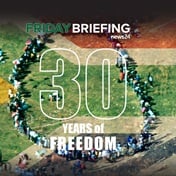
On Monday thousands of South Africans rallied around the farming community in nationwide protests against farm murders. The #BlackMonday campaign raised several questions about the legitimacy of farmers' concerns, the overall issue of crime in South Africa and whether farm murders are racially motivated. Scenario planner and CEO of the South African Institute of Race Relations, Frans Cronje, unpacks the issue.
How serious is the problem of farm attacks?
Before answering that question we always warn that this is a very complicated area of data. The answers hinge on how analysts define farms, farmers, and the crimes against them.
For example, if smallholdings are included in the definition of farms, it influences the data to a considerable extent. So too when the data relates to farmers or their extended families and farm workers. Comparative estimates depend on the benchmark that is used – for example, are we comparing farmers to the national murder rate or the overall armed robbery rate?
Depending on what combination of variables are included it is possible to show both that farmers may be up to 12.8 times more likely to be attacked in their homes than other South Africans and also that they may be twice as likely to be murdered. However, one can also show that their murder rate is on par with that of all South Africans.
Was the #BlackMonday protest justified?
Farmers are not unique in experiencing violent criminal onslaughts but the nature of those onslaughts is unique – this is the very essence of the point. The same would be true of night shift workers, security officers, Uber drivers, and shopkeepers. They all suffer from horrendous levels of violence and would each be justified in drawing public attention to how they experience that violence.
What critics of the #BlackMonday protest must guard against is turning the crisis of farm murders into a competition about who in society is more or less likely to be attacked. This is a completely pointless and destructive exercise. The common fear of violent crime should unite rather than divide South Africans.
You say that farmers are not unique in experiencing violent crime. How serious is the overall problem of violence faced by South Africans?
South Africa demonstrates appalling levels of serious and violent crime. Almost half a million people have been murdered in the country since 1994. Despite falling by over 50% our murder rate is thirty times higher than countries that range from Italy to Australia, Ireland and the United Kingdom – so you can see how pointless it is to argue over who is most at risk.
Since 2002 the number of armed home invasion robberies have increased by over 130% and armed business robberies by 258% and climbing – benchmarks that suggest the violent crime position is worsening.
Are some politicians correct when they accuse the #BlackMonday protestors of caring mainly about white lives?
A first point is that not all farmers are white. Very important data recently released by Agri-SA shows that more agricultural land is controlled by black people than is commonly understood.
As regards the question of race the majority of those murdered would appear to be white farmers. Some analysts may say that this is because there are more of them – others say there are racial and political motives (a point we will get to below).
Black farmers are also being murdered. Farmers Weekly, for example, reported on a black farming couple who were attacked on their farm in the Free State. The man was shot dead while his wife was raped and shot in the face to die later. His white neighbours came to his rescue but were too late – just as there have been examples, most recently this week, of black people risking their lives to protect white farmers.
Are farm murders motivated by racism?
It is possible to suggest that the racial nature of the political stigmatisation of farmers means that white farmers are more likely to be murdered than black farmers. In some attacks racial incitement was probably an enabling factor that contributed to the attack and the torture the farmer or his family endured.
Black commercial farmers may equally be identified as sell-outs and singled out for attacks.
Every crime is unique and there will therefore be racial aspects to some farm attacks but not all farm attacks are racial. Each incident of a crime will have a unique motive – robbery, revenge, or something else. You cannot group all farm killings by motive.
Is there a political motive to farm killings?
We have interviewed, off the record, senior police officers who have attended the very worst farm killing scenes. They were certain that no political motive existed for the killings. However, they were police officers not policy and political experts.
We would say that political rhetoric describing farmers as thieves, murderers, and rapists who should be removed from their farms has, in an already violent and angry society, contributed to a situation where farmers are more, rather than less, likely to be attacked and killed.
The gratuitous and at times racist nature of some attacks reinforces this impression.
We would therefore say that while we know of no formal strategy to terrorise farmers – a climate has indirectly been shaped in which a terror-style attacks should be expected to occur. This is particularly so as the protection on offer to rural communities has been reduced by the State.
What do you make of the view that farmers are facing a genocide?
We do not support the view that a politically inspired genocide of white farmers is underway in South Africa – and those who claim one exists risk being dismissed as a lunatic fringe with the risk that the very real plight of farmers is dismissed with them.
Will the #BlackMonday protests improve the security situation on farms?
It is trite that with South Africa's very high levels of violent crime farmers will not be secure until the broader society is secure. Likewise, the society will not be secure until farmers are secure.
From South Africa's very high levels of serious and violent crime you can surmise that the State is failing in its responsibility to protect its citizens. Farmers because of their relatively isolated homesteads are very vulnerable and the State's ability and efforts to protect them fall far short of what is required.
Their security position was worsened by a series of post-1994 policy decisions including the abandonment of the commando system which was a sound and effective system, moratoriums of the hiring of police reservists, and the general shambles around the training and equipping of reservists.
The protests have been effective in highlighting some of these failings and building political pressure around them, and this is very good, but until they are addressed neither farmers nor the broader community will be safe.
Does the political will exist to help farmers?
I don't think the political will exists to help any South Africans overcome the scourge of crime in their communities. So there can be no doubt that insufficient political will exists to help farmers, as we saw this week in the appalling response of the African National Congress to the #BlackMonday protests.
But the same is true for people living in shack settlements as Khayelitsha Commission of Inquiry did so well to highlight – and you will recall that the government and the ruling party were as angry and dismissive of the findings of that enquiry as they were about Monday's protests.
Middle class suburbs right across the country have also been deserted by the State to fend for their own security as testified to by the now almost half a million private security officers in the country – an increase from just over 100 000 in 1994.
What should farmers and, for that matter, the rest of society do?
It would be easy to answer your question with a platitude about how the government and communities should get together to combat crime. But I will not do that – because it would be offensive to millions of South Africans who go to bed every night worried about the safety of their families – and to the hundreds of thousands who have survived criminal attacks.
It is surely apparent to all but the most naïve of observers that the South African government does not care about the safety of its people and will rather seek to play frightened communities off against each other in an effort to deflect attention from the failures of policing.
Until South Arica gets a better government the most practical answer is for communities to look to themselves, through well-developed neighbourhood watch schemes as just one example, to safeguard the lives and property of people living in their community.
There are examples of these that have worked very well where they have served to unite communities – from taxi association to farmers in one case study we looked into. Abandoned by their politicians South Africans need to take charge of their own security.




 Publications
Publications
 Partners
Partners























